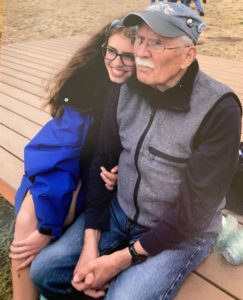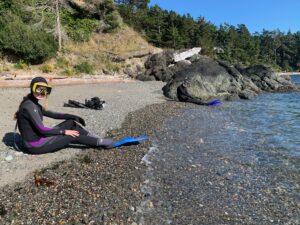
My name is Kaia, and I’m a high school sophomore currently interning at Friends of the San Juans. Some of you may know my grandpa, San Olson, current board member, past board president, and longtime resident of Lopez Island. It is largely because of my grandpa that I have the chance to write this letter to you about plastic pollution. From a young age, I saw him working alongside other members of the community, taking steps towards a cleaner future. I knew that was what I wanted to do to. I heard him tell stories of beaches covered in scuttling crabs, reminisce of years where starfish were abundant, and remember a time when plastic, packaged TV dinners-not the ocean. The fact is that I, and most of my generation, doesn’t remember those days.
We’re growing up in a world where science has become politics, where 8 million tons of plastic enter the oceans annually, and where a pandemic isn’t the only crisis we’re faced with. Amid a climate crisis it’s easy to become overwhelmed and lose hope under a tidal wave of issues. But where there’s change, no matter how small, there’s hope. And so, I implore you to change something you can, something we all can, something that is tangible and strongly felt here in the Islands – our use of plastic.
Yes, single-use plastic is skyrocketing during the COVID-19 pandemic, but it doesn’t have to. Studies show that the virus can survive for 72 hours on plastic as opposed to 24 on paper and fabrics (New England Journal of Medicine). The plastics industry has been encouraging the misconception that single-use plastic is safer than reusables when in fact, cleaned properly, reusable alternatives are far safer than plastic. I personally refuse to let decades of progress towards a plastic- free world be unraveled by a misconception ungrounded in science, but rather in an industry’s desire to make money from an outdated concept.
Going single-use plastic free is a journey. Fortunately, there are hundreds of small, everyday changes that are manageable to make. You can learn more about these tips and find other resources at Plastic Free Salish Sea’s newly launched website: www.plasticfreesalishsea.org. I have been working on this project during my internship at Friends. The website is a resource for local information related to solid waste, recycling, and how to reduce your dependence on single-use plastics. I also created a “toolkit” with guidance about reducing plastic in schools. Please share this letter with the students, teachers and administrators you know.

The most important thing to remember is that we don’t need a handful of people going perfectly plastic-free, we need many trying. Sure, you may forget your reusable silverware once or twice and use a plastic one, but it happens to all of us. I know I speak for your children, grandchildren, great-grandchildren, nieces and nephews, my entire generation, when I say this: thank you for your desire to help. By moving away from plastic and towards a greener world, you make us proud.
